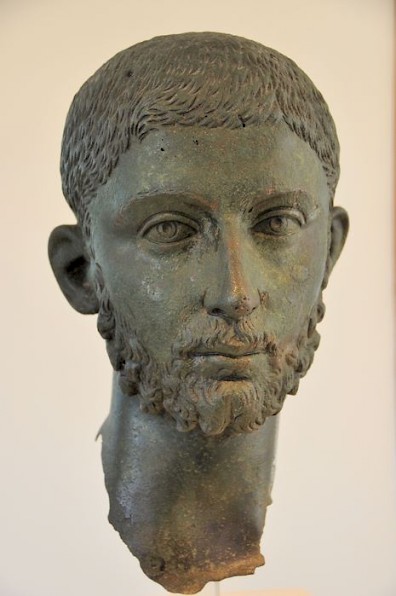Cassius Dio
Cassius Dio (164-c.235): Roman senator of Greek descent, historian, author of a very important Roman History.

Like Arrian of Nicomedia and Appian of Alexandria, Cassius Dio (164-c.235) was a Greek by birth and a Roman by conviction, and one of the great historians of Antiquity. He belonged to a wealthy family (Dio Chrysostom was his grandfather) and became a senator during the reign of Commodus, was made consul by Septimius Severus (204), served as governor in Asia, Africa (223), and Pannonia Superior, and had the rare distinction of being made consul for a second time, together with the emperor Severus Alexander (229).
Dio started his literary activity in the 190s and wrote his Roman History in the years 211-233. It is a marvelous book. Where we can compare it to other historical studies (e.g., we can read his account of the reign of the emperors Tiberius, Caligula, Claudius, and Nero together with Tacitus' Annals), Dio is often better, and for certain periods (e.g., the reign of Augustus and the second century), he is our most important source. Unfortunately, large parts of the Roman History are only known in Byzantine excerpts.
One Byzantine author, Photius, wrote the following commentary:
We read the History of Cassianus Coccianus (or Coccius) Dio, in eighty books. He begins with the arrival of Aeneas in Italy from Troy, the foundation of Alba and Rome, and goes down without a break to the murder of Antoninus named Elagabalus, who was also called Tiberinus, Sardanapalus, Pseudantoninus, and Assyrius on account of his vices. He also says something about the reign of [Severus] Alexander who, after the death of Antoninus, who had adopted him as his colleague in the empire, escaped the danger that threatened him and succeeded to the throne. The writer tells us that this Alexander was consul for the second time together with himself, and that the emperor, desirous of honouring his colleague, himself defrayed the necessary expenses in connexion with his office. The author was appointed governor of Pergamon and Smyrna by Macrinus, and was afterwards commander of the forces in Africa. Soon afterwards he was governor of Pannonia. Elected consul for the second time, he was allowed to return home owing to bad feet, to spend the rest of his life in Bithynia, as his "genius" had predicted, "beyond the reach of slaughter, bloodshed, and tumult."noteHe was born at Nicaea in Bithynia, which in one part is surrounded by the lake called Ascania. His style is grandiose and bombastic, reflecting the consciousness of mighty events. His language is full of antiquated constructions, and of words in keeping with the importance of the events described. His periods are full of protracted parentheses and ill-timed inversions. The rhythm and the abrupt interruptions, being carefully employed, owing to the general clearness, escape the notice of the casual reader. The speeches, after the style of those in Thucydides, but clearer, are excellent. In almost everything else also Thucydides is his model.
The full text of this work, in English translation, can be found here.